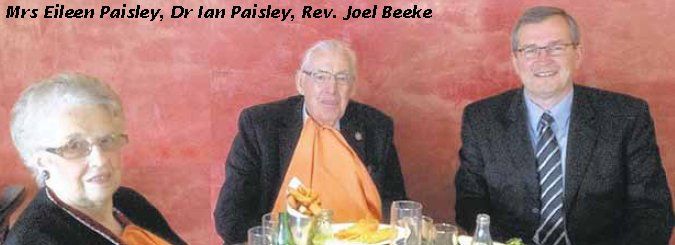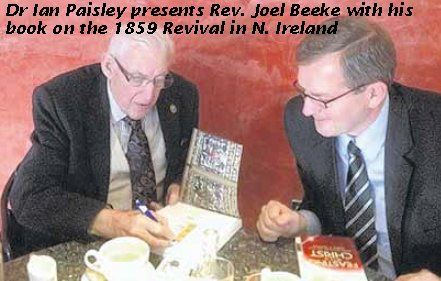The big interview
Rev. Dr Joel R. Beeke, of Puritan Reformed Theological Seminary in Grand Rapids, Michigan, met this September with Lord Bannside, PC, and Baroness Paisley, over private lunch.
Here is Dr Beeke’s account of the occasion with Lord Bannside and Baroness Paisley (from now on in this article, Dr Ian and Eileen Paisley — no disrespect intended).
Dr Paisley founded and led the Democratic Unionist Party in Northern Ireland from 1971–2008. He was the leader of the Irish Protestants during many years of conflict and violence between Protestants and Roman Catholics.

At first, it was a rather surreal experience as the Paisleys pulled up with their security guards, but what a delightful time we had. Dr Paisley, now 86 (last February, he nearly died in hospital), came across as open, honest, spiritual, thoughtful and humorous.
His wife is accomplished too. She has served in Parliament, is an author, and articulates well their past experiences.
While Dr Paisley was enjoying his fish and chips, he willingly answered some questions I had prepared for him. Here they are, together with his answers:
Q. After many decades of experience in ministry, what two major pieces of advice would you give a theological student who is about to enter a lifetime of ministry?
A. Know your Scriptures and be a man of prayer. These are the two most important things in the ministry. If ministers are strong in the Scriptures and strong at the throne of grace, they are nearly in heaven already.
Q. In the midst of an incredibly busy life, how does one manage to stay close to God, in terms of personal experiential fellowship with him and his Son, by his Spirit?
A. You must not let anything break into your personal prayer and devotional life. The first book I reach for, all my life, is the Bible.
As a minister and a politician, it is essential to be well grounded in the Scriptures, since you’re engaging in spiritual warfare that sometimes demands ‘beheading people’! You need to be instructed from the book, and you must remain on speaking terms with the Lord.
Communion with God, as you well know, is a scarce thing today. The prayers of many Christians are far too shallow, and mostly selfish. We need to rise above these things as leaders.
Another important thing to maintain is family worship. We kept up family worship from our earliest days. We all prayed together on our knees and the Lord has blessed that for ourselves and our children. One son is now a minister and the other son is in Parliament.
Q. You have been a major leader in both the ecclesiastical and political spheres. In terms of exercising leadership in these spheres, do you see any difference between them? Are the same skills needed in both?
A. In both professions it is all about getting your orders from above and obeying them. No one in public life should leave home in the morning prayerless and careless. Leaders must remember that they are constantly going out into deep combat, so they need to know God’s will and then do it.
Q. You and I have a common love — great Christian books. You have a tremendous library, which you are presently opening up as a reading room so that others can benefit from the tens of thousands of books you have collected over a lifetime. What has your library meant to you throughout your life? What two books have most impacted your thinking? What is your favourite book?
A. Let me say first that in homiletics, church history and the exposition of Scriptures, we have been left a great treasury. Through books in your hands, you can benefit greatly from godly men who were guided by God and spoke with God. A minister, or even a lay Christian, who doesn’t unlock this treasury is a poor man.
Second, the big problem with many Christians today is that they don’t read the books they should read. They read largely trash. They could better burn most of those books.
Third, it is important for ministers not to become merely the echo of what they have read. But ministers do need to know what others have said. Our big problem today is that television has destroyed the nation in terms of reading and study.
Another big problem is that people are not consistent in their Bible reading. They act as if, when they do read, they are obliging God. But they don’t realise God is actually obliging you by giving you his Word.
Finally, the first book that touched me deeply as a child was Pilgrim’s progress. It is amazing that in Bunyan’s own day some did not want him to publish it — and actually warned him not to do so — but it is pure gold.
Also, all of the Puritan works have greatly impacted me. If a man owns Puritan writings, he has all the finest of the wheat and doesn’t need much else. These great Puritan works make a superb treasury when all brought together.
Q. There is an old Dutch saying that ‘he who stands in the front, gets kicked in the rear’. You have stood in the front most of your life, both in church and in politics. How have you managed to cope with all the criticism that that entails — especially when, as King David says, your own familiar friends have lifted up their heel against you? What advice would you give to young ministers who are just beginning to face criticism?
A. Expect criticism. If you’re doing anything for the Lord, the devil will be aware of this. If a man is working for God, he is under attack. There is no discharge in this war.
Get the Lord’s armour of Ephesians 6 to cover you and the stones won’t touch you. You’re invincible when you have God’s armour on. Keep on the Lord’s way — which is usually through both difficult afflictions and joyful times — and decide throughout to be joyful in his ways.
Then too, don’t forget that others are entitled to criticise you. This is part of the cross. We don’t need to be vindicated, because we are only bearing Christ’s cross after him. Our vindication will come on the Judgment Day, but even that is not important. Only Christ’s vindication is important; we are but unworthy servants.
If you respond to criticism well, then, as you grow older in the Lord’s work, there comes a time when criticism just passes you by. It then doesn’t really bother you much, as you have more to do with the Lord than with people. We need to remember that John 3:16 is enough for time and eternity.

Q. As you look back over your long life, what is the best decision you ever made by God’s grace? What decision do you most regret?
A. By grace, the best decision I ever made was when I knelt at my mother’s knee, aged 6, and received the Lord Jesus Christ as my personal Saviour.
From that time on, I felt an urge to speak about Christ to others. I was privileged to lead my first convert to Christ when aged 8. I had a friend who I would walk home with from school. One day he expressed his need to me for a Saviour. I took him aside and explained the gospel to him.
Together we found a place off of the beaten path where we knelt down together, prayed to God earnestly for his salvation, and my friend was truly saved that day. He has been walking with the Lord ever since and today is a faithful gospel minister.
What do I regret? I regret all my sins — and there are hundreds of them.
After this interview, Mrs Paisley told us some stories of remarkable conversions connected with her husband’s ministry. I’ll just mention one of them. One man hated her husband so much that he moved to Texas to get away from Dr Paisley’s constant emphasis on the need to be born again.
But once he was settled in Texas, Dr Paisley’s voice kept ringing in his ears: ‘Ye must be born again’ — to the point that the man fainted under the stress.
A friend found him and helped him recover. He told his friend about his spiritual struggles. His friend then said, ‘I have a tape you have to listen to’. Imagine how shocked the poor man was to discover the tape was by Dr Paisley!
He went home but refused to listen to it. Finally, to quieten his raging conscience, he decided to listen to it, though he still hated the speaker. But as he listened, the Holy Spirit brought him powerfully to the cross and he was saved.




